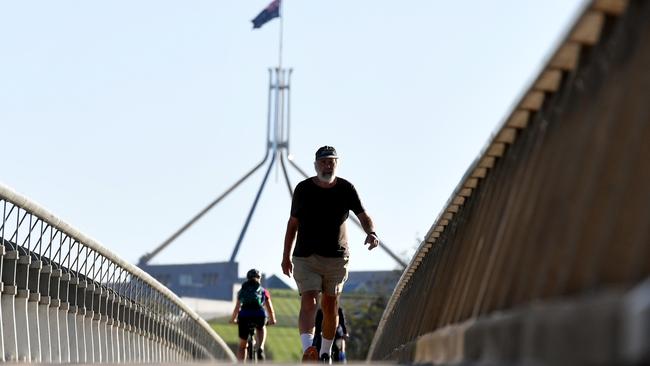Big government as saviour in the time of coronavirus

These are “extraordinary times”, as Reserve Bank governor Philip Lowe said on Thursday while launching a mammoth monetary rescue package to pump the banks with super-cheap money, so they can help cash-starved businesses and households meet their debt obligations. The official cash rate is at a negligible 0.25 per cent. The central bank will be engaging in our version of quantitative easing, buying Treasury bonds in the secondary market, aiming to hit a target of about 0.25 per cent for the benchmark three-year bond. Plus the RBA will make room on its balance sheet for a new three-year funding facility worth at least $90bn, so banks can lend to businesses feeling the pinch. In one sense, the RBA chief has pre-emptively bailed out the banks. This is not conventional policy, to say the least.
Dr Lowe has looked down the time tunnel to the bank’s first governor, Herbert Cole “Nugget” Coombs, post-war Keynesian nonpareil and self-described “activist and interferer”. In various key roles, Coombs sought to control the commanding heights of the economy to improve human welfare. In return for today’s sovereign-backed buffering, or platinum-grade safety net, the banks have a chance to get back to basics. They hopefully will pick up the mantle of being the “handmaiden of industry”, rather than the gouging, fee-for-no-service miscreants of the royal commission. It is the big four’s redemption moment. On Friday, the major banks cut borrowing rates for business, announced six-month payment holidays for some customers and offered mortgage deferrals for those who lose their jobs. The lifeline to small business could be worth $8bn.
Josh Frydenberg called the banks’ response a “game changer” in boosting confidence and welcomed the prodigal institutions back to “Team Australia”. In fact, the national squad is getting larger by the day. Creeping into the discourse is the idea that Canberra could nationalise, temporarily, failing industries. Airlines, airports and a range of private operators in the tourism sector have been hammered due to COVID-19 containment policies. Should taxpayers pick up the pieces, even for strategic assets? Are football codes critical infrastructure? Even old battles are bubbling up. History shows governments are terrible at running industries. The business lobby is freshly aghast. But dogma is not the flavour of these desperate times and Scott Morrison is nothing if not a policy pragmatist, as is the Treasurer.
Mr Frydenberg’s second budget has been postponed until October. Who can forecast anything over a week in these volatile times, let alone across a four-year budgetary cycle? The Morrison government’s fiscal playbook is now all about short-run survival. Whatever it takes is the operating mode, translated to “cushioning the blow” for the masses. The initial $17.6bn stimulus, not yet legislated, looks puny. The next phase is likely to focus on income support for displaced workers. The Prime Minister says the guiding principles are that support measures are scaleable and sustainable for the duration. It’s still early days in the construction, and debt financing, of the emergency welfare state.
This newspaper believes society functions best when government steps aside, allowing free enterprise and individuals to flourish. But this is a time of contagion; governments of every hue are bending established principles to fight a biological foe that has the power to overwhelm defences and destroy our way of life. Mr Morrison has vowed to “keep Australia running” while doing everything possible to preserve lives. That means, for a time, massive deficits, rising debt, a loss of cherished liberties and, for good and ill, Big Canberra in the driver’s seat of national life.


The policy pendulum has swung swiftly to contain the coronavirus pandemic. We are living, perhaps for years, in the age of government interference. Suddenly, state paternalism is back in vogue. The orthodoxy here, and in many comparable nations, is to throw everything we can at COVID-19, an enemy we can’t stop but, as Scott Morrison said on Friday, one that can be defeated by slowing it down. Hence the need for closing our borders to non-residents, 14-day self-isolation of returned travellers, bans on public gatherings and other restrictions aimed at “flattening the curve” of infection. The economic cost of these social distancing and other measures is immense. For the next six months, at least, Canberra and the states will be trying to protect citizens from illness, limit the blow from an economy in distress and herd Australians across the chasm of despair to a better place. Who would have thought, in 2020, a return of the idea of government as saviour.